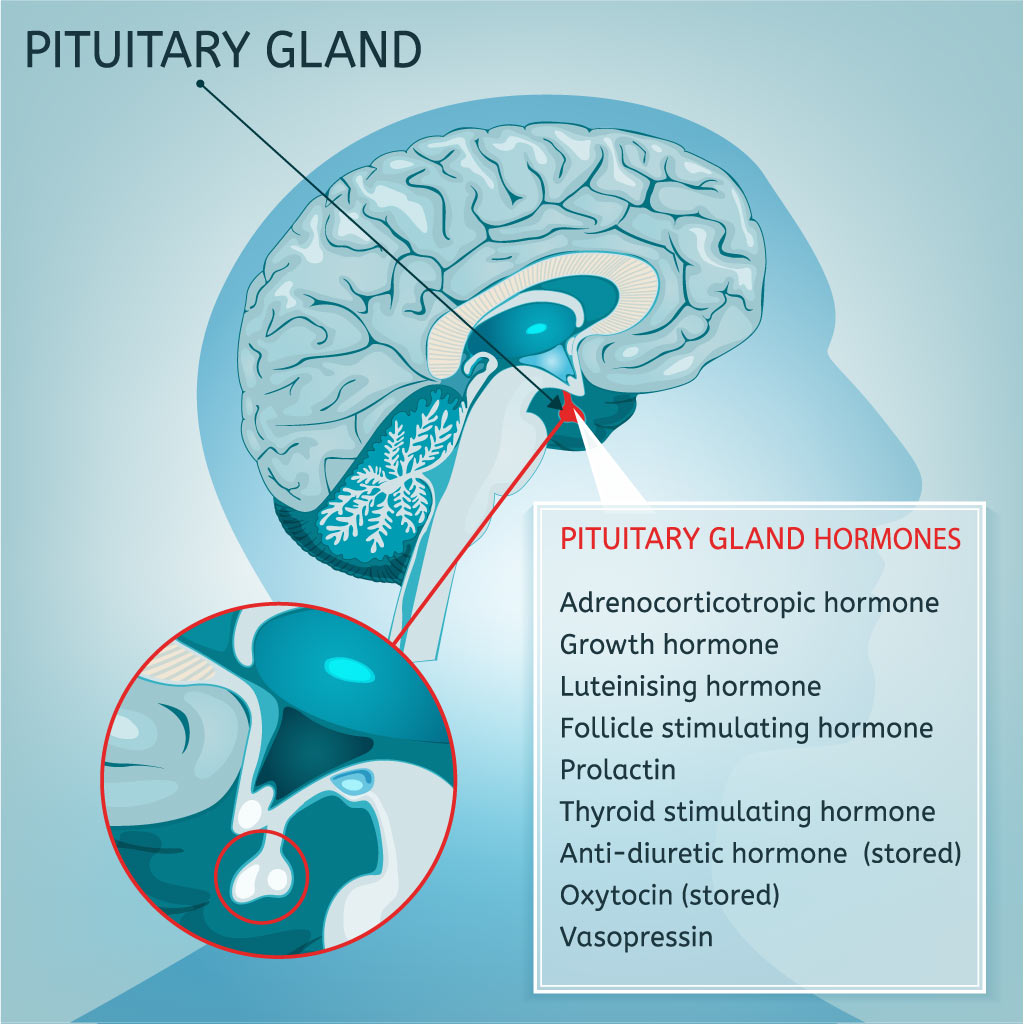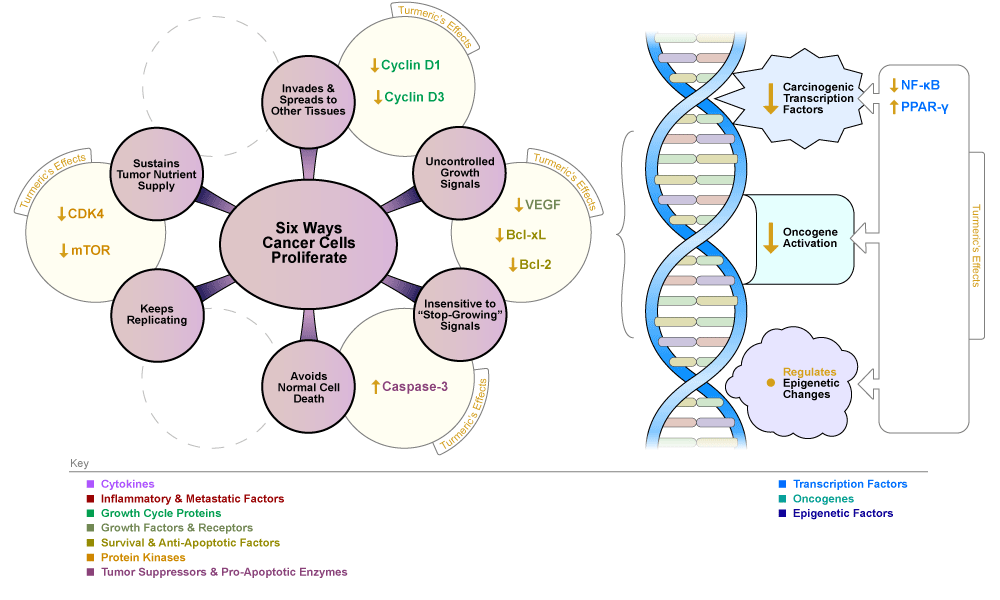
Can Turmeric Help Treat Pituitary Tumors?
The pituitary is a small gland in the brain that secretes hormones. It also controls thyroid hormone production. Pituitary tumors are often nonmalignant and don't cause symptoms. However, some noncancerous pituitary tumors can cause debilitating hormonal conditions such as Cushing's disease. Large, aggressive pituitary tumors can also cause vision problems by pressing on optic nerves. (vi.23, 380-383)
Although conventional treatments are successful for many people, for a sizable majority they are not. Scientists have found novel ways that may help treat these difficult tumors, and turmeric may be able to help. (vi.23, 383)
What Causes Pituitary Tumors?
In most cases, the cause is unknown. However, some inherited conditions increase susceptibility for pituitary tumors: (vi.382)
- Multiple endocrine neoplasia type 1 (MEN-1)
- Carney complex
There is also some evidence that suggests exposure to certain toxins or medications may increase the risk of developing tumors in the pituitary:
- Chronic exposure to herbicides such as amitrole or picloram, which can cause damage to the pituitary. (vi.384)
- Use of certain medications (prescribed for schizophrenia, bipolar disorder, Tourette syndrome, and autism) that cause excess prolactin hormone production. (vi.385, 386)
Conventional Treatments for Pituitary Tumors
In tumors that secrete hormones, drugs that suppress those hormones are typically given. Not only do these medications help control the hormonal effects and symptoms, but they also help slow tumor growth. Surgery and sometimes radiation are the main treatments to control tumors that don't respond to drug therapy or aren't secreting hormones. (vi.383)
However, surgery for larger, more aggressive tumors that don't respond to drug therapy is only successful in about 30% of patients. For these tumor types, lab and animal studies suggest that targeting specific proteins may help: (vi.383)
- Promoting PPAR-γ, a protein that helps regulate hormones, may help shrink tumors. (vi.383)
- Blocking mTOR enzymes involved in cell growth and metabolism, but which are over-produced in pituitary tumors. (vi.387, 388)
Some researchers say that stimulating PPAR-γ and suppressing mTOR may also help with metabolic syndrome conditions. That's good news because some metabolic conditions, such as obesity, are associated with the hormonal imbalances caused by pituitary tumors. (vi.389)
Metabolic syndrome may also increase the risk of different types of cancer. According to preliminary studies, PPAR-γ can also stop pituitary cancer cells from growing. (vi.389)
How Can Turmeric Help?
Research suggests turmeric may be a safer alternative to some drugs used to treat invasive pituitary tumors. For example, the diabetes drugs rosiglitazone and troglitazone stimulate production of PPAR-γ. However, these types of drugs can have dangerous side effects, and animal studies indicate that high doses would have to be used to treat pituitary tumors. Turmeric and its curcumin compounds increase levels of PPAR-γ as well, but without the adverse side effects of the 2 diabetes medications. They can be ingested safely — even at high dosage levels. (vi.5, 341, 383, 389, 390)
Turmeric compounds could also help relieve some of the whole-body side effects of pituitary tumors, such as hyperpigmentation. Dark spots on the skin can be caused by pituitary tumors producing too much ACTH hormone. ACTH promotes proteins that stimulate melanin, the pigment-compound in skin. (vi.23, 391, 392)
Research shows curcumin can suppress excess hormones, and may even be able to help treat Cushing's disease. Clinical studies suggest that creams made with curcumin or turmeric oil can help lighten dark spots and even skin tone. (vi.23, 393-396)
How Do Turmeric Compounds Work on Pituitary Tumors?
Pre-clinical lab and animal research show turmeric compounds have the following effects:
| Turmeric Compound | Effects |
|---|---|
|
↑ PPAR-γ, a hormone-regulating protein that has anti-metabolic syndrome and antitumor effects in the pituitary gland. (vi.389, 397) |
|
|
↑ PPAR-γ, a hormone-regulating protein that research shows can stop the growth of cancerous and nonmalignant pituitary tumors. (vi.389, 398) |
|
|
Curcumin and Curcumin Analogs (vi.71) |
↑ Cell-cycle arrest and apoptotic cancer cell death in multiple pituitary tumor cell lines. (vi.23) ↑ Enzymes that induce cancer cell death. (vi.23) ↑ Apoptosis in pituitary tumor cells. (vi.396) ↑ PPAR-γ, a hormone-regulating protein that research shows can stop the growth of cancerous and nonmalignant pituitary tumors. (vi.389, 390) ↑ Effectiveness of bromocriptine, a first-line drug therapy for pituitary tumors that secrete prolactin and growth hormones. (vi.399) ↓ Cell cycle proteins and kinase enzymes that promote cancer growth. (vi.23) ↓ Excess hormone production caused by pituitary tumors. (vi.23, 399) ↓ Number of pituitary (and breast) tumors in rats exposed to acute and chronic radiation. (vi.400) ↓ mTOR, a kinase enzyme overexpressed by pituitary tumors. (vi.388, 401) ↓ Activation of NF-κB, in inflammatory factor that promotes tumor growth. (vi.396) ↓ Pituitary tumor growth associated with Cushing's disease. (vi.396) ↓Proteins that help tumor cells survive. (vi.396) ↓ VEGF, a growth factor that helps stimulate angiogenesis, which is linked to aggressive pituitary tumors that can turn malignant. (vi.402) |
|
↓mTOR, a kinase enzyme overexpressed by invasive pituitary tumors. (vi.388, 401) |
|
|
↑ PPAR-γ, a protein that studies show can stop the growth of cancerous and aggressive benign pituitary tumors. (vi.389, 390) |
|
|
↑ PPAR-γ, a protein that regulates hormone production and can stop aggressive pituitary tumor growth. (vi.389, 390) |
|
|
↑ PPAR-γ, a hormone-regulating protein that can halt the growth of pituitary tumors. (vi.389, 390) ↓ mTOR, a kinase enzyme overexpressed by pituitary tumors. (vi.365, 388) |
|
|
Turmeric Extract |
↑ PPAR-γ, a hormone-regulating protein that research shows can stop pituitary tumor growth and help with metabolic syndrome. (vi.389-398) |
Join the 1000s of People Who Are Discovering the Benefits of Turmeric.

Healthceuticals® Turmeric Curcumin Complex
100% Certified
Organic ingredients
- Organic Turmeric Extract - standardized to 95% curcuminoids.
- Organic Whole Turmeric - provides full spectrum antioxidant, anti-inflammatory turmeric benefits, including turmerones and numerous vitamins, minerals, and phytonutrients
- Organic Black Pepper Extract - standardized to 95% piperine; dramatically enhances bioavailablity.
- Organic Phospholipids - markedly improve absorption.
- Organic Ginger - works synergistically with turmeric to provide more powerful benefits.
- Absolutely FREE of potentially harmful additives and fillers such as magnesium stearate.





